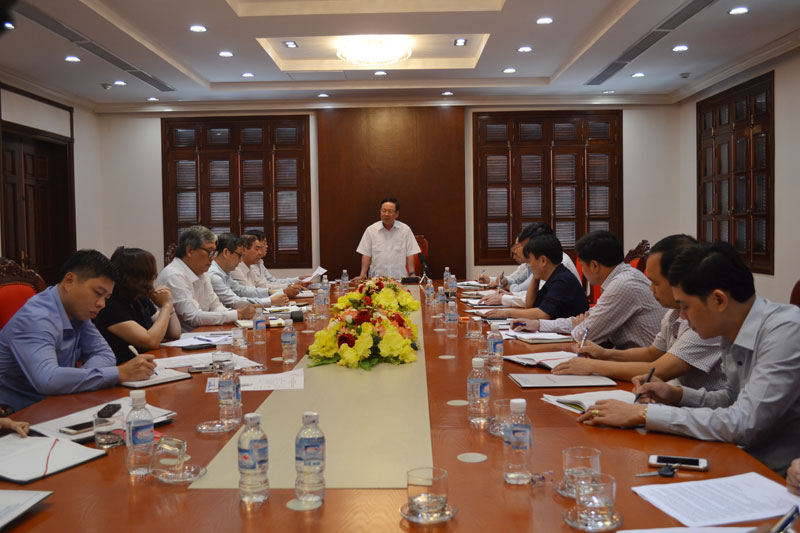
(HBO) – Bui Van Tinh, member of the Party Central Committee and Secretary of the Hoa Binh provincial Party Committee, had a working session on November 16 on the employment situation and policies targeting workers in local industrial parks (IPs) and clusters.

Bui Van Tinh, member of the Party Central Committee and
Secretary of the Hoa Binh provincial Party Committee, speaks at the working
session.
As of October 2017, eight IPs in Hoa Binh province had been
added to Vietnam’s IP development plan until 2015, with a vision to 2020. Four
of the IPs have been operational with 71 investment projects, including 22 FDI
projects. Forty-five projects have been put into operation, creating jobs for
16,300 workers, including over 12,200 women, or nearly 50 percent of total
workers at businesses in Hoa Binh province.
While 7.06 percent of the workers hold at least
a university degree, 60.2 percent underwent vocational training, and another
12.68 percent haven’t enrolled in any training courses.
Most of the businesses based at local IPs,
especially FDI firms, have seriously complied with legal regulations on labour.
They have paid social insurance premiums for over 80 percent of total employees
and provide workers with steady jobs with income basically higher than the
region-based minimum wage approved by the Government each year.
IPs in Hoa Binh provinces have set up 27
grassroots-level trade unions which gather more than 13,000 members. The trade
unions at IPs and relevant agencies have instructed enterprises to hold
dialogue with labourers. They have also paid attention to workers’ material and
spiritual lives, such as by organising art and sports activities and giving
Lunar New Year bonus.
At the working session, Secretary of the
provincial Party Committee Bui Van Tinh appreciated companies’ contributions to
local socio-economic development, but he also pointed out their shortcomings.
He asked local authorities to build a manpower
training mechanism for businesses and help them attract workers and solve the
market-labour relationship. They also need to improve investment promotion
activities so as to enhance both quantity and quality of projects, thereby
creating steady jobs for local people.
The provincial Department of Labour, Invalids
and Social Affairs should assess the employment demand in localities across Hoa
Binh. Meanwhile, authorities should encourage the construction of social
housing and create favourable conditions for the private sector to build houses
for workers in line with the State’s regulations.
Tinh urged stronger dissemination of relevant
policies and laws among workers so that they can fully understand their rights
and interests. He also requested strict management of food safety in labourers’
meals and the working environment, and provision of services like medical
examination for workers. Local administrations also need to address late
insurance payment while honouring businesses with good employment provision and
adherence to legal regulations./.
In the spirit of "Party members go first, the people follow”, all households of Party members in the Doan Ket sub-region in Da Bac town, Da Bac district, voluntarily removed gates and fences, and donated land when the road expansion project passed through their properties. Inspired by their example, 68 households in the sub-region quickly followed suit, contributing over 1,400 sq.m of residential and perennial cropland to widen the main road through the residential area. The exemplary role of Party members in Doan Ket stands as a shining example of studying and following President Ho Chi Minh’s thought, morality, and lifestyle.
The Hoa Binh provincial People's Committee held a monthly meeting on May 29 to assess the implementation of socio-economic development tasks in the first six months of 2025, the progress of key projects, and some other important issues.
During his lifetime, President Ho Chi Minh always expressed his deep affection and special concern for children and youth. He once emphasized: "Caring for and educating children well is the responsibility of the entire Party and the entire people”; "First of all, the family (i.e. grandparents, parents, siblings) must do this job well”. "the Party Committees…, the Children’s Committee, the Youth Union, the education sector, and all related organizations must have specific plans to ensure children grow healthier and more progressive”. His teachings has been remaining valuable and serving as the guiding principles in the work of protecting, caring for, and educating children. In line with this ideology, Hoa Binh Province has continuously been prioritizing and investing resources in the well-being of children in recent years.
Mr. Nguyen Phi Long, the alternate Member of the Party Central Committee and Secretary of the Provincial Party Committee chaired the meeting of the Standing Committee of the Provincial Party Committee to provide opinions on several investment projects within the province. There was the attendance of Ms. Bui Thi Minh, the Permanent Deputy Secretary of the Provincial Party Committee and Chairwoman of the Provincial People’s Council; Mr. Bui Đuc Hinh, the Deputy Secretary of the Provincial Party Committee and Chairman of the Provincial People’s Committee and other members of the Standing Committee; the leaders from other departments, agencies, and some localities.
The Standing Board of the Vietnam Fatherland Front (VFF) Committee of Hoa Binh province held a meeting on May 28 to honour outstanding village elders, village heads, and reputable individuals from local ethnic minority and religious communities.
In mid-May, the provincial Museum organised an exhibition named "Duoi la co Dang Cong san Viet Nam quang vinh” (Under the flag of the glorious Communist Party of Vietnam). This meaningful activity took place in the joyful atmosphere to celebrate the country's major holidays and the Party congresses at all levels for the 2025-2030 term, towards the 14th National Party Congress.



